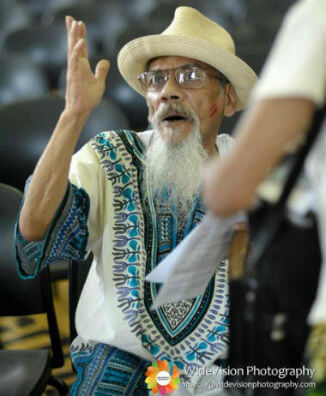
Many consider Rivera to be a necessary bridge between the African and Latino and Latina communities. He grew up in the African American community of Bedford-Stuyvesant in New York City, culturally coming from twin backgrounds: Puerto Rican Spanish in the home and extended family (both sides) with cultural roots in the Black community. Attending both African American and Spanish-speaking churches infused his voice with a powerful sense of music. Growing up with first-generation replants from the South, in the housing projects built specifically for G.I.s returning from World War II, Rivera was exposed to a culture that coincided with rural Puerto Rican values and outlook.
Training
Rivera trained as a journalist and began to hone his editing skills while in college. The African American and Puerto Rican student population at City College during that time was approximately 15 percent of the total student body. Yet, out of four student weekly newspapers, none really reflected that community’s capacity to write and develop journalism skills. In response, Rivera founded The Paper, a student publication of political analysis and commentary, which became the first college-student weekly tabloid in the entire city to be run completely under the auspices of Black and Puerto Rican students. It allowed students an arena to develop skills in journalism by focusing on New York City’s community issues as well as the immediate concerns of campus students. During his tenure as editor, Rivera turned out fifty trained writers a semester, and The Paper actually broke six stories that were later reported in the major dailies, including a lead story on the passage of what came to be known as the Rockefeller Drug Laws. In 1973, Rivera was awarded City College of New York’s 125th Anniversary Medal in recognition of his efforts to train a new cadre of student journalists. By the early 2000s, The Paper was the only student-developed institution from that period (1968–1972) that remained completely in the hands of students.
Are You With Me? (Louis Reyes Rivera 1945 – 2012) from ivarad on Vimeo.
In 1969, Rivera was part of the student movement that ushered in open admissions and that legitimized what is referred to as “ethnic studies.” By the time the Black Studies and Puerto Rican Studies departments were in place, Rivera had received his bachelor of arts in sociology and English in 1974 from the City College of New York.
Rivera reverted to self-initiated studies in order to learn what he had missed in his formal education. In his words, “Education is really more like being tricked and trained to meet the demands of labor.” He had studied on his own since he was fifteen, and he viewed teaching as “Sharing information that is supposed to be part of a natural inheritance, just by virtue of our birth.” Eventually, he was presented with opportunities to share the results of his research; he began teaching while still an undergraduate.
